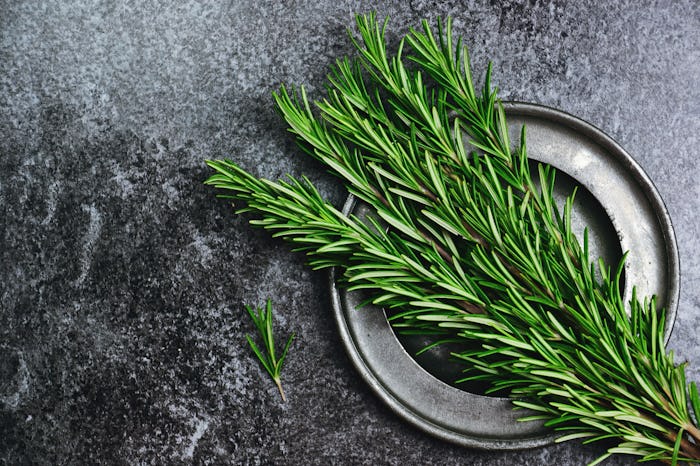Life

Here's Why Rosemary's So Helpful At Preventing Lice, According To Experts
Parents everywhere are getting their kids ready for fall activities, which means lots of opportunities for germ sharing and bug sharing — yuck. Lice is every parent's worst nightmare, but luckily there are some ways you can prevent those pesky bugs from invading your child's precious locks. There's tons of information out there about what can prevent a lice infestation and if you've heard of essential oils or herbs like rosemary, you may be on to something. But does Rosemary prevent lice? Here's what actually works, according to experts.
While lice is never fun, it is treatable. Most parents are able to keep bugs at bay with over-the-counter lice shampoo, but can parents actually prevent bugs from getting onto their kids in the first place? According to research, the answer is yes. I checked in with a few experts on the topic to see what natural alternatives actually work when it comes to preventing a yucky lice infestation. Dr. Nikola Djordjevic is a family doctor and the medical advisor for Loud Cloud Health, and Jamie Bacharach is a health and wellness expert and alternative medicine specialist for Maple Holistics, and runs her own private practice. They both gave me their expert insights on natural lice prevention and as it turns out, there are some safe and effective options.
Whether you're looking to prevent an infestation or you want to treat one without the harsh chemicals, you may have some options. Dr. Djordjevic tells Romper in an email, "Some studies have shown that plant oils such as rosemary, eucalyptus, and lemongrass may work as a lice repellants."
Bacharach confirms this, explaining that "tea tree oil is lauded for its antimicrobial and anti-inflammatory properties that can not only kill lice, but reduce the number of eggs that are hatched as well. Rosemary oil is known for cleansing your scalp and balancing your sebum production, which can also help to reduce the recurrence of lice." Research has also shown promise in using essential oils like citronella, according to an article on Mayo Clinic — which may actually work as lice repellent, too (plus your kiddo will be totally sweet smelling). So, if you know ahead of time that lice is going around your kid's school, you may want to stock up on some of these essential oils as a precautionary measure. But there are some things you should know before using them.
Before you go showering your child in essential oils, Dr. Djordjevic says it's important to keep in mind these natural products are often not regulated by the FDA and "sometimes we don’t have clear instructions on how to use them safely. Some of them, if we fail to use them properly, can irritate the lungs, be toxic, and irritate the skin." So, be sure to check with your child's doctor and do your research before using any natural products. If you're good to go though, Bacharach says you can dilute the oils before you apply. "Apply the essential oil to your [child's] scalp once you've diluted it with a carrier oil like olive oil. Leave overnight and rinse out in the morning," she says.
If you have an active lice infestation, you can follow up by combing your child's hair for nits. Dr. Djordjevic says simply adding "just a few drops of tea tree oil or lavender oil in your shampoo might deter lice, too."
Some other oils worth mentioning are lavender oil and peppermint oil, according to The Head Lice Center website. However, some of these oils should be used with caution. For example, eucalyptus essential oil is not recommended to use on children under the age of 5. While tea tree oil "should not be used in its pure form on babies, young children, and pregnant women, and should not be applied on a daily basis," according to the Head Lice Center. This is why it's important to always check with your doctor before giving yourself or your child homeopathic treatments, and be sure to avoid contact with eyes or sensitive skin areas.
If you're looking for something natural but more a little more mild, Bacharach says, "Organic oils like olive oil or coconut oil can be effective for suffocating lice without the use of harsh chemicals. Coating your hair in oil and sleeping with a shower cap overnight will ensure that the lice die. This procedure requires an overnight process since lice can hold their breath for up to eight hours."
Other preventive measures parents can take when it comes to avoiding lice include telling children to avoid "head to head contact," says Dr. Djordjevic. She also says that kids "should make sure they’re using their own brush or comb and avoid sharing it with other people." Also, she says it's not a good idea to leave your coat in a shared coat closet, just in case.
Bacharach also stresses the importance of checking your child's hair. "Regularly checking your [child's] hair for lice is an essential component of preventing an infestation. Catching lice quickly can help you to avoid them spreading." She says you can use a lice comb to perform these checks.
Sometimes it may be impossible to prevent an infestation though. But if you have any questions or concerns, always check in with your pediatrician to see what treatment and prevention options are right for your child. Lice may be gross, but at least keeping them away can smell pretty good.
This article was originally published on